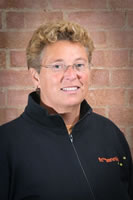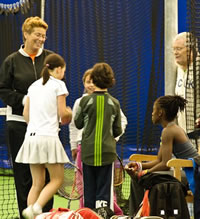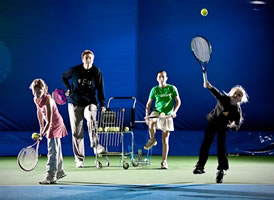It's A Whole New Ball Game
We speak to former British number one Jo Durie about coaching the youth of today
|
She’s the former British number one tennis player who reached a world ranking of 5 in 1983 and now she’s right here in Chiswick coaching Britain’s future hopefuls.
I caught up with her at the newly opened fc**tennis academy, based on the same site as Duke Meadows Golf Club, where she runs the independent international centre of excellence specializing in tennis education alongside her former coach Alan Jones. Formed in partnership with the Lawn Tennis Association and French Connection (UK), the academy recently moved from north London to Chiswick and provides an integrated programme of educational and sporting development. But the game is very different to the one Jo played as a junior.
“The problem is with tennis is that it’s a difficult sport to learn,” said Jo, “And if you want to be good it’s a hard road. I’m glad I had my career when I did.”
Jo turned pro in 1977 and retired in 1995, “I had a good long career. I literally started with a wooden tennis racket, white tennis balls and everyone used to talk to each other and go out for meals. We would tour together and play silly games in the changing rooms. When I left the tour it was all very different. Everyone then was cocooned, they still are with their managers, pysios etc. I’m really glad I trained when I did in that era because I saw things change.
 “Now it’s a very tough environment. There are obviously a lot more countries that play tennis so it’s very difficult to make a living unless you’re say top 100 in world as a woman and maybe top 150 for men. I still love tennis myself but I wouldn’t actually like to be a junior nowadays.”
“Now it’s a very tough environment. There are obviously a lot more countries that play tennis so it’s very difficult to make a living unless you’re say top 100 in world as a woman and maybe top 150 for men. I still love tennis myself but I wouldn’t actually like to be a junior nowadays.”
Jo, along with fellow tennis player Annabel Croft, spoke out recently about how they believe British junior tennis has been taken over by cheating, intimidation and even thuggery. Croft suggested "the really nasty world" of British junior tennis forced her daughter to quit, and described a match where a boy "was just screaming 'out', or "double fault" or "15-40" before the ball had landed a foot in. Meanwhile, the boy being cheated was bursting into tears."
“It’s not pleasant at all,” continued Jo, “people are so worried about their ratings, you got to have certain ratings, you’ve got to win so many matches play so many matches where has the progress of being a junior gone to? Where are the long term prospects? You’re not going to be a professional at 10. These days woman can starting competing from 15, Laura Robson has just turned 15 I still think that’s too early to be on the circuit. Its push and shove and a slap here and there I’ve seen it and it’s not pleasant. The pressure on the kids these days is immense, it really is.”
 Jo works closely with her former coach Alan Jones at the academy to make ensure that their young players have a different experience. “Alan’s been with me a long time, he was my coach since I was 18. He asks the parents, ‘what do you want from your child? Do you want them to turn out a well rounded figure who can cope with pressure, play for their own enjoyment and challenge, not yours the parent, but the child’s and make sure they’re learning along the way?’ Work hard, yes we do push them hard, but we want them to love it rather than getting to 18 and not speaking to their parents ever again.”
Jo works closely with her former coach Alan Jones at the academy to make ensure that their young players have a different experience. “Alan’s been with me a long time, he was my coach since I was 18. He asks the parents, ‘what do you want from your child? Do you want them to turn out a well rounded figure who can cope with pressure, play for their own enjoyment and challenge, not yours the parent, but the child’s and make sure they’re learning along the way?’ Work hard, yes we do push them hard, but we want them to love it rather than getting to 18 and not speaking to their parents ever again.”
fc**tennis was founded by French Connection owner Stephen Marks. “Steve sponsored me as a teenager, I really needed that money at the time and he asked for nothing back he just said to Alan [Jones], make her good that’s all. After four or five years when I started getting really good Steve said ‘I don’t think you need my money anymore do you Jo’ and I said no but thank you.
“And here we are it’s come round again and thanks to Steven this is his place. He wanted tennis here. We outgrew North London, we needed more courts so he said I will build it for you and you produce the players.
The academy coaches 30 children at the moment who come in and out depending on how much time they can get off school. Those who attend the academy full time are currently home tutored but there are plans to include a classroom in the refurbishment which will mean that tutors will be available on site for the full time juniors.
“It’s a big decision; some children can’t cope with the long days whilst others can. It’s also a big decision for the family as a whole not just the parents who have to ferry the child backwards and forwards everyday but the rest of the family, it’s a huge commitment. And it costs a lot money. As much as Stephen Marks puts into the program, we can’t cover everything. We do cover as much as we can and there is some funding from the LTA but it’s still a big commitment.”
The list of past and recent fc:tennis coaching successes includes:
• Developing two British players who reached the top 5 in the world
• Coaching British players to four Grand Slam singles semi-finals
• Coaching winners of ATP and WTA tour events
• Coaching a holder of 2 Grand Slam Doubles titles (Wimbledon, Australia)
• Coaching a previous World No.5 and British No.1
• Having developed more British National Event champions than any other existing coaching team
“No other academy in Britain can demonstrate this volume of success, this depth of experience and this continuity of staffing. These factors create the foundations of an environment and atmosphere unrivalled in Britain. All of us here believe passionately that British tennis can be so much better than it has and is; that it can achieve so much more than it does; and that it can give so many more children a better chance of success.”
As well as coaching, Jo commentates at Wimbledon, a tournament she first played in 1977, losing in the first round to eventual champion Virginia Wade. During 18 years on the professional circuit Jo won seven national titles, reached the ladies' singles quarter-finals of Wimbledon and, with Jeremy Bates, took the mixed doubles title at Wimbledon in 1987 and at the Australian Open in 1991. She also reached the semi-finals of the US Open and Roland Garros.
Does she ever yearn to get back out on court? “Sometimes a wish I was out there. I love the grass courts but in Australia I was commentating at the Open it was so hot, 44 degrees I thought thank god I’m so glad I’m not out there, I do enjoy being a spectator for that one!”
Emma Brophy
March 20, 2009
